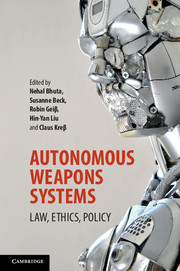Book contents
- Frontmatter
- Contents
- List of contributors
- Acknowledgements
- PART I Introduction
- PART II Meanings of autonomy and human cognition under automation
- PART III Autonomous weapons systems and human dignity
- 5 Are autonomous weapons systems a threat to human dignity?
- 6 On banning autonomous weapons systems: from deontological to wide consequentialist reasons
- PART IV Risk, transparency and legal compliance in the regulation of autonomous weapons systems
- PART V New frameworks for collective responsibility
- PART VI New frameworks for individual responsibility
- PART VII Conclusion
- Index
5 - Are autonomous weapons systems a threat to human dignity?
from PART III - Autonomous weapons systems and human dignity
Published online by Cambridge University Press: 05 August 2016
- Frontmatter
- Contents
- List of contributors
- Acknowledgements
- PART I Introduction
- PART II Meanings of autonomy and human cognition under automation
- PART III Autonomous weapons systems and human dignity
- 5 Are autonomous weapons systems a threat to human dignity?
- 6 On banning autonomous weapons systems: from deontological to wide consequentialist reasons
- PART IV Risk, transparency and legal compliance in the regulation of autonomous weapons systems
- PART V New frameworks for collective responsibility
- PART VI New frameworks for individual responsibility
- PART VII Conclusion
- Index
Summary
Introduction: human dignity – an integrative and open concept
‘Human dignity’ has become one of the most important integrative formulas in international politics. Since 1948, when it was introduced into Article 1 of the United Nations Universal Declaration of Human Rights, it has successfully functioned as an umbrella concept that bridges seemingly insurmountable ideological gulfs and provides a basis for consensus and compromise. Similarly to other political guiding concepts such as justice, liberty, peace or, more recently, sustainability, human dignity is an essentially open concept that leaves room for varying interpretations and contextualizations and thereby allows even the otherwise fiercest adversaries to speak with one voice.
Another reason why human dignity has been increasingly introduced into constitutions and international treaties since 1948 is the wish for an absolute – a foundational principle that overarches, as it were, all constitutional and other political principles, a common reference point that is beyond controversy and conflict and plays the role, in Kantian terms, of an a priori to which all other political ideas are subject. Human dignity is predestined for this role because of two characteristic factors: the openness of its content and its independence of any particular metaphysical background theory. The extent to which the concept is semantically open is documented by its function as a heuristic tool in the process of gradually extending the canon of basic human rights. Although it is generally agreed that there is a stable connection between the idea of human dignity and the idea of basic human rights, the number and identity of the rights associated with the idea of human dignity is not static but, rather, dynamic. What human dignity implies – its content and consequences – has no fixed magnitude but is open to interpretations that extend its range and content into new directions, though in continuity with its established content. Extensions usually respond to new threats posed, for example, by new and unexpected political constellations, natural phenomena or technological developments. That human dignity shares this dynamic character with human basic rights supports the widely held assumption that the notions of human dignity and basic human rights are closely linked to each other.
- Type
- Chapter
- Information
- Autonomous Weapons SystemsLaw, Ethics, Policy, pp. 105 - 121Publisher: Cambridge University PressPrint publication year: 2016
- 14
- Cited by



